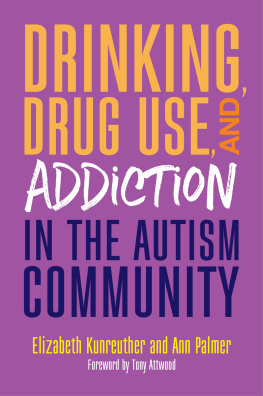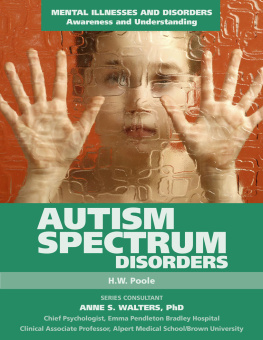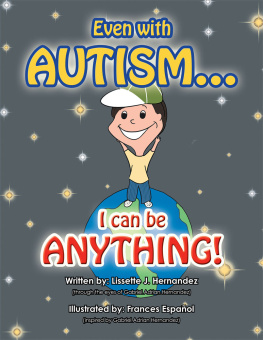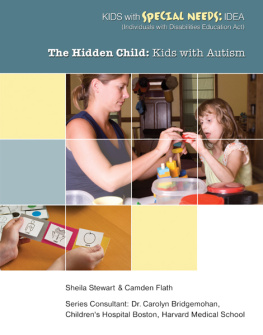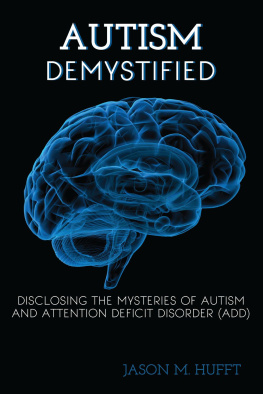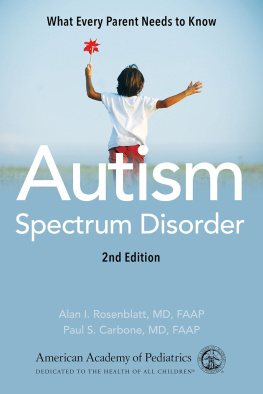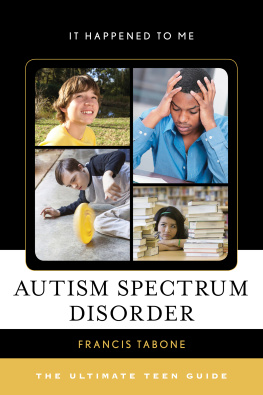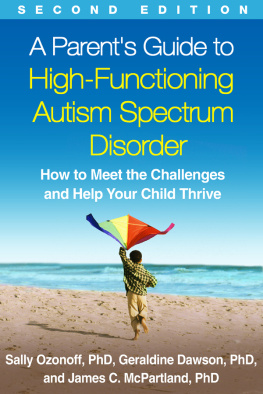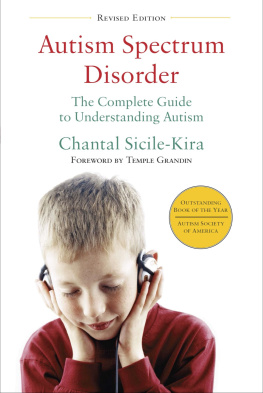
DRINKING ,
DRUG USE ,
AND
ADDICTION
IN THE AUTISM
COMMUNITY
Elizabeth Kunreuther and Ann Palmer
Foreword by Tony Attwood

Jessica Kingsley Publishers
London and Philadelphia
CONTENTS
FOREWORD
Tony Atwood
I was delighted to be invited to write a foreword to this book, as I have long recognised the high level of addiction in those who have an ASD, from both my professional and personal experience, having members of my own family who have an ASD and addiction.
It used to be assumed that those who have an Autism Spectrum Disorder are not at greater risk of developing an addiction than those with any other developmental disorder. However, in my own clinical practice. I have seen an increasing number of adolescents and adults with ASD who have signs of addiction, primarily alcohol and drug dependency, and excessive time engaged in computer games. The question has then arisen as to why someone with an ASD is predisposed to develop such an addiction. The simple explanation is either to engage reality or to escape reality. To explain this seemingly contradictory statement, the specific characteristics of ASD need to be considered.
One fundamental characteristic of ASD is a difficulty socializing with, and being accepted by, peers. The machinery of social engagement creaks and squeaks, and alcohol and marijuana can act as social lubrication. The person with ASD may find socializing easier when mildly intoxicated; substances such as alcohol, marijuana and other drugs reduce social anxiety, and create a sense of relaxation and competence. Unfortunately, the person may then become dependent on these to facilitate any social engagement.
Another characteristic of ASD in adolescence is the tendency to be rejected by peers, engendering feelings of not belonging to any specific group or culture. The acquisition and consumption of alcohol and drugseasily available and the currency of popularity and statuscan provide membership of a sub-culture composed of others who also do not fit into conventional society. However, they do accept those who are different and marginalized. This sub-culture has clear rules and expectations in how to dress, talk and behave, and has its own language and rituals, friendships are formed, and the person is warmly welcomed, especially if he or she becomes a drug courier or supplier. Thus, for the wrong reasons, the person with an ASD belongs to a group and is accepted and valued by peers.
In the case of gaming, there can be an intense engagement, which provides a sense of achievement and identity, often through natural talent and considerable practice. The achievements in group player games on the Internet can lead to the person being popular with fellow gamers, who seek and admire his or her abilities, knowledge and guidance. When playing the game there is little, if any, social chit chat, and no requirement to process non-verbal communication or follow social conventions. The game provides excitement, respect and popularity, and becoming an avatar creates an enjoyable alternative reality.
Many of my clients describe trying to cope with racing thoughts, which are difficult to slow down, and ruminations that are extremely difficult to block. Alcohol and drugs can induce a deceleration of thoughts that are speeding out of control, and can stop ruminations. Computer games can also be a very effective thought blocker to both ruminations over past events, and persistent negative thoughts that lead to low self-esteem and depression. These games can also act as an energizer when the person is socially and emotionally exhausted.
We recognize that around 85 percent of those who have ASD also experience high levels of anxiety. Alcohol and drugs, both legal and illicit, can provide relief from constant feelings of anxiety. Some medications prescribed to reduce anxiety, such as the benzodiazepines, can themselves become addictive, with the person developing increased tolerance. There can also be a dangerous misuse of other prescription medications as the person self-medicates for anxiety, with the potential for a hazardous interaction of substances, and the very real risk of accidental overdose.
There are high levels of unemployment associated with ASD, leading to boredom, frustration and a sense of uselessness and under-achievement. Being part of the drug or gaming culture can provide purpose and structure for the day. There is a sense of achievement in seeking and finding drugs, and an opportunity to leave ones accommodation and to meet people. Completing the various levels of the computer game can also provide structure and achievement, and the development of expertise that is recognized and valued by fellow gamers.
The use of substances or engagement in computer games can provide a sense of protection, anaesthetizing the person from the effects of past trauma, such as being bullied, or being the victim of emotional, physical, financial or sexual abuse. The addiction may alleviate any feelings of depression about the past, the current situation and future prospects.
Thus, there are many reasons why someone who has an ASD is vulnerable to developing an addiction. The next question is what to do when there are signs of addiction.
The first stage is to recognize the addiction, which may be affecting mental and physical health, and sometimes, as in the case of substance abuse, leading to criminal activities to pay for the substances. The person who has the addiction may lack insight into the depth of the addiction, failing to recognize their inability to cope without mind-altering substances or access to gaming. If there is recognition of the addiction, there nevertheless may be resistance to reducing the level of substances or engagement, as the person may not be able to conceptualize life without their prop.
The second stage is to address the dysfunctional use of substances and games. In the case of drugs, this may mean providing prescribed and carefully administered and supervised alternative medication. In the case of computer games, the amount of time gaming can be gradually reduced, and a wider range of activities encouraged, providing a sense of achievement and social engagement. Throughout this process, access to a clinical psychologist is beneficial, to provide advice, treatment and support for anxiety management, and to encourage the development of social skills and new social networks.
While the diagnosis of ASD may provide a rationalization for the addiction, it must also be considered when accessing support and therapy services. There will be those who enter the treatment services for addiction who have undiagnosed ASD; it is important that there is routine screening for ASD of all new participants in rehabilitation therapy and services for addiction, not only to determine the possible reasons for the addiction, but also, importantly, to modify the therapy according to the characteristics of ASD.
Rehabilitation services often rely on social living and group therapy and activities, and provide limited opportunities for personal space and solitude. The person with an ASD will benefit from a single room wherever possible. They will also need guidance and support in the social and disclosure requirements in group therapy. For example, there can be difficulties recognizing social and personal boundaries, converting thoughts and feelings into speech, knowing when to talk in a group, understanding how to resonate with the experiences and emotions of fellow addicts, and acknowledging the relevance of self-disclosure in a group setting. Staff need to know of these characteristics of ASD and must make appropriate accommodations.
Next page
